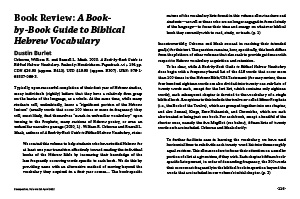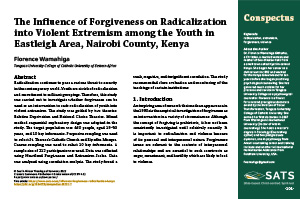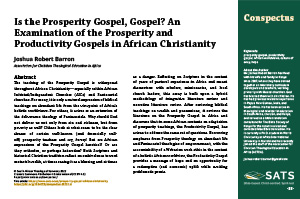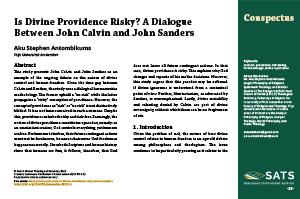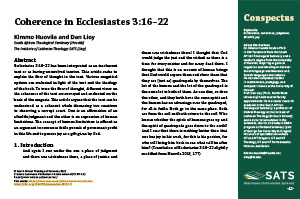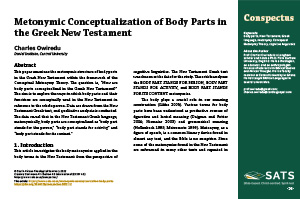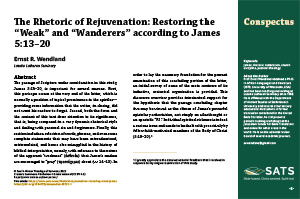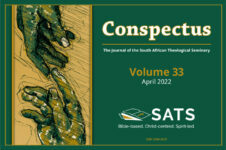Book Review (Extended): A Guide to Bible Translation: People, Languages, and Topics by Philip A. Noss and Charles S. Houser
A Guide to Bible Translation: People, Languages, and Topics is a general reference resource produced mainly through the joint efforts of the United Bible Societies (UBS) and the Summer Institute of Linguistics (SIL), with the participation of many people associated with the Nida Institute…
Book Review: A Book-by-Book Guide to Biblical Hebrew Vocabulary by William R. Osborne and Russell L. Meek
Typically, upon successful completion of their first year of Hebrew studies, many individuals (rightly) believe that they have a relatively firm grasp on the basics of the language, as a whole…
The Influence of Forgiveness on Radicalization into Violent Extremism among the Youth in Eastleigh Area, Nairobi County, Kenya
Keywords: radicalization, extremism, forgiveness, violence
Radicalization continues to pose a serious threat to security in the contemporary world. Youth are at risk of radicalization and recruitment to militant groupings. Therefore, this study was carried out to investigate whether forgiveness can be used as an intervention to curb radicalization of youth into violent extremism. The study was guided by two theories: Relative Deprivation and Rational Choice Theories…Is the Prosperity Gospel, Gospel? An Examination of the Prosperity and Productivity Gospels in African Christianity
Keywords: prosperity gospel, productivity gospel, African worldviews, culture of envy, hope
The teaching of the Prosperity Gospel is widespread throughout African Christianity—especially within African Initiated/Independent Churches (AICs) and Pentecostal churches. For many, it is only a natural expression of biblical teachings on abundant life from the viewpoint of Africa’s holistic worldviews. For others, it arises as an extension of the deliverance theology of Pentecostals…Is Divine Providence Risky? A Dialogue Between John Calvin and John Sanders
Keywords: creation, providence, risk-taking, foreknowledge, divine repentance
This study presents John Calvin and John Sanders as an example of the ongoing debate on the nature of divine control and human freedom. Given the time gap between Calvin and Sanders, the study uses a dialogical hermeneutics methodology. The former upheld a “no risk” while the latter propagates a “risky” conception of providence…Coherence in Ecclesiastes 3:16–22
Keywords: Ecclesiastes, coherence, judgment, afterlife, joy
Ecclesiastes 3:16–22 has been interpreted as an incoherent text or as having unresolved tension. This article seeks to explain the flow of thought in the text. Various exegetical options are evaluated in light of the text and the theology of the book. To trace the flow of thought, different views on the coherence of the text are surveyed and evaluated on the basis of the exegesis.…Metonymic Conceptualization of Body Parts in the Greek New Testament
Keywords: body parts, New Testament, Greek language, metonymy, Conceptual Metonymy Theory, cognitive linguistics
This paper examines the metonymic structure of body parts in the Greek New Testament within the framework of the Conceptual Metonymy Theory. The question is, “How are body parts conceptualized in the Greek New Testament?” The aim is to explore the ways in which body parts and their functions are conceptually used in the New Testament in reference to the whole person…The Rhetoric of Rejuvenation: Restoring the “Weak” and “Wanderers” according to James 5:13–20
Keywords: James, rhetoric, restoration, church discipline, pastoral theology
The passage of Scripture under consideration in this study, James 5:13–20, is important for several reasons. First, this pericope occurs at the very end of the letter, which is normally a position of topical prominence in the epistles—providing some information that the writer, in closing, did not want his readers to forget. Second, both the form and the content of this text draw attention to its significance…Conspectus 33
April 2022


